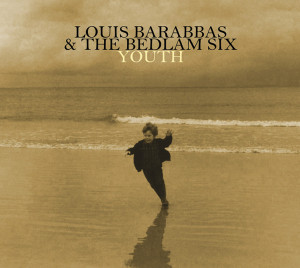The full lyrics to every track on Youth, together with a song-by-song commentary from Louis Barabbas.
2. I Want To Know More
3. Tonight
4. The Debtor’s Wife
5. It Hurts So Much To Hold
6. Waiting For Bad News
“The old bark lumbered on, heavy with her age and the burden of her cargo, while I lived the life of youth in ignorance and hope.”
– Joseph Conrad, “Youth: A Narrative” (1898)
Introduction
 This was never supposed to be a concept album.
This was never supposed to be a concept album.
But concepts have a habit of creeping into the spaces we leave vacant, leaving trails for notions and fancies, nesting down in the deep holes, laying their eggs. Songs written years apart, separated by geography and circumstance, are somehow drawn together like lost twins in some winsome Jacobean comedy.
I admit I always wanted this album to have a certain thematic trajectory, but nothing so rigid as a narrative (with, heaven forbid, a moral at the end). When I sit down to write a song I rarely begin by declaring my intentions. In fact, I rarely sit down at all. Most of the notes that later get polished up into lyrics are jotted down whilst wandering around town observing things – usually human beings and their dirty doings: couples who are presumably in raptures of love endlessly baiting each other, laying traps for later, brandishing their secret weapons, nurturing the blossom of each other’s natural frailties until both are so utterly ensnared in the creepers of romance that neither is quite sure where the affection ends and the obligation begins. Most of our first album, Found Drowned, is about that stuff – conversations overheard in supermarket queues uttered by the terminally amorous.
But Youth is a rather more innocent animal. Its mind is not yet made up.
I definitely feel like I’m more of a participant in this one. The writing of it spans my twenties. A few of the tracks have been recorded before, but somehow came out malformed or simply didn’t get along with their bedfellows on other would-be albums (that would later emerge as reluctant EPs).
 This is the record these songs were waiting for. I must confess that I’m glad to finally be free of them.
This is the record these songs were waiting for. I must confess that I’m glad to finally be free of them.
For me this album is about growing up. It begins with a man blaming everyone but himself for all the ills and imperfections in his life. It ends with some degree of acceptance and atonement. In between there is desire and frustration and uncertainty and humiliation. He meets people, he changes his mind (or has his mind changed for him), he makes mistakes and he even learns a few lessons.
There are other voices (such as The Debtor’s Wife), but this is primarily the story of a boy teetering on the threshold of incurable maturity, pawing at the tangled fronds of his shrivelling potential.
It’s got a few jokes in it too.
Louis Barabbas
October 2013
